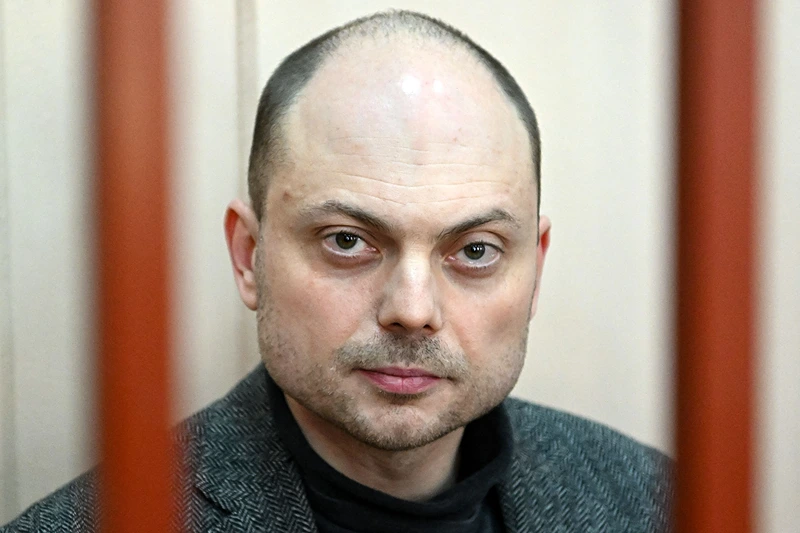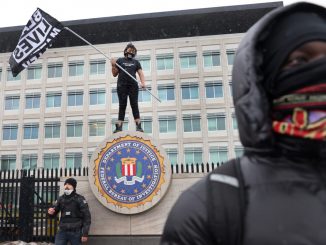

OAN Brooke Mallory
UPDATED 5:02 PM – Monday, April 17, 2023
Vladimir Kara-Murza, a notable Kremlin critic, has been found guilty of treason and other crimes in what he claimed was a politically-driven prosecution.
He was sentenced to 25 years in prison by a Moscow court on Monday.
Kara-Murza, a 41-year-old opposition politician and father of three who possesses both Russian and British passports, has long spoken out against Russian President Vladimir Putin and has been successful in persuading Western nations to impose sanctions on Russia and specific Russian citizens for alleged human rights breaches.
He was charged by state prosecutors with treason and other crimes for circulating “knowingly false information” about the actions of the Russian military during what Moscow refers to as its “special military operation” in Ukraine. They had requested a 25-year sentence.
Since Putin’s ascension to power in 1999, this punishment is believed to be the toughest one ever imposed on a Kremlin opponent.
Kara-Murza, whose family’s residence is in Washington and who had returned to Moscow to advocate against the war, claimed that Russia was ruled by a “regime of murderers” in an interview with CNN that was aired hours before his arrest.
Additionally, he had accused Russia of attacking people in Ukraine during talks in the U.S. and Europe, an accusation that Moscow has since denied.
Kara-Murza, who had been listening to the proceedings in silence inside a glass courtroom cage, uttered the opposition anthem “Russia will be free” after learning he would have to spend the next 25 years in a maximum-security prison colony.
He grinned while he was led by authorities and reportedly told one of his attorneys, Maria Eismont, that he saw the severe punishment as a reward for his efforts.
“When he heard he’d got 25 years he said, ‘My self-esteem has gone up, I understand that I did everything right. It’s the highest score I could have got for what I did, for what I believed in as a citizen and a patriot,’” Eismont said.
Kara-Murza’s wife, Evgenia, mirrored that attitude on Twitter and compared his protracted incarceration to receiving an “A+” for bravery, realism, and honesty. She wrote, “I am infinitely proud of you, my love, and I’m always by your side.”
In a separate incident, she claimed at a Washington Post event that the punishment demonstrated how much her husband was feared by the Russian government.
Kara-Murza compared his trial, which was conducted behind closed doors, to Joseph Stalin’s show trials in the 1930s in his closing remarks last week. He claimed that he was proud of all he had said and done, but he chose not to petition the court to free him.
Kara-Murza’s team would file an appeal against Monday’s verdict, according to Eismont, who claimed that her client had been denied phone access to his kids for nearly a year. Eismont also claimed that her client had been subject to judicial irregularities.
When questioned about the decision, the Kremlin stated that it does not comment on court rulings. Kara-Murza, according to a well-known state TV personality, received what he deserved.
In London, the British government announced that it had summoned the Russian ambassador to express its displeasure over what it deemed a “politically-motivated” conviction. In 2020, Britain slapped sanctions on the judge overseeing the case for alleged violations of human rights.
Reporters were informed by British Ambassador Deborah Bronnert outside the Moscow court that Kara-Murza had been punished for speaking out fearlessly against Russia’s invasion of Ukraine, requesting his release.
Alongside Bronnert, U.S. Ambassador Lynne Tracy claimed that Kara-Murza’s conviction was an effort to muzzle opposition.
“Criminalisation of criticism of government action is a sign of weakness, not strength,” Tracy said.
Maria Zakharova, a spokeswoman for the Russian foreign ministry, condemned the action of the Western diplomats and said they might be called in to be reminded of what “diplomats should and shouldn’t do.”
In February of last year, just after sending tens of thousands of troops into Ukraine, Russia enacted broad wartime censorship regulations that have been applied to stifle dissenting opinions.
Presently, distributing intentionally false information about the army can result in a 15-year prison term, while “discrediting” it can result in a five-year prison sentence.
Russian pro-government leaders portray the crisis in Ukraine as an existential struggle with the West and stress the importance of societal cohesion. They have labeled any Russians who disagree with Moscow’s activities in Ukraine as being a part of a pro-Western fifth column attempting to sabotage the military operation.
Kara-Murza claimed that Russian security services poisoned him twice, in 2015 and in 2017, causing him to become suddenly ill. Both times, he went into a coma before waking up.
The Russian government denies any role in either event. Kara-Murza’s attorneys claim that as a result, he now has polyneuropathy, which is a severe nerve disorder.
Towards the end of March, after a civilian hospital’s checkup revealed that his condition was deteriorating, Eismont stated that his legal team was extremely worried about his health.
Alexei Navalny, an opposition politician who is incarcerated and whose health is in jeopardy, proclaimed at a court proceeding that Kara Murza’s conviction was unlawful and appeared to be retribution for not dying after being poisoned.
The founder of the R.Politik analysis firm, Tatiana Stanovaya, claimed that Kara-Murza’s advocacy for sanctions against Russia has long frustrated the Kremlin and that his conviction, which depended on a newly-expanded definition of treason, was a sort of warning.
“This is a verdict aimed at sending a signal and probably not the last of its kind,” Stanovaya wrote on the Telegram messaging app.
“In the future, the security services can be much less choosy and seize anyone if they are on Russian territory and a critic of the Putin regime. This is a warning to all anti-Putin activists, don’t come back or we’ll put you in jail, de facto for life.”
Stay informed! Receive breaking news blasts directly to your inbox for free. Subscribe here. https://www.oann.com/alerts





Be the first to comment